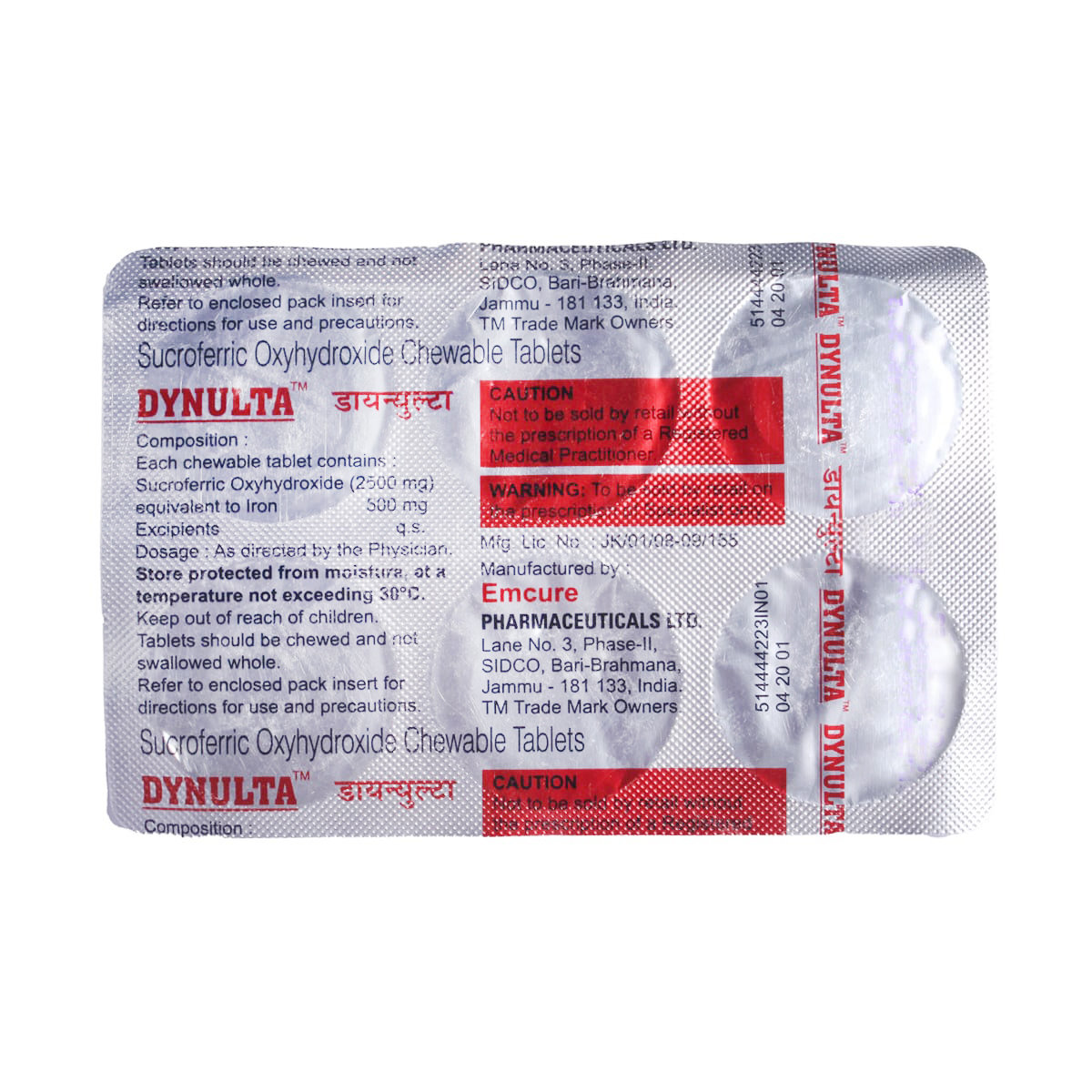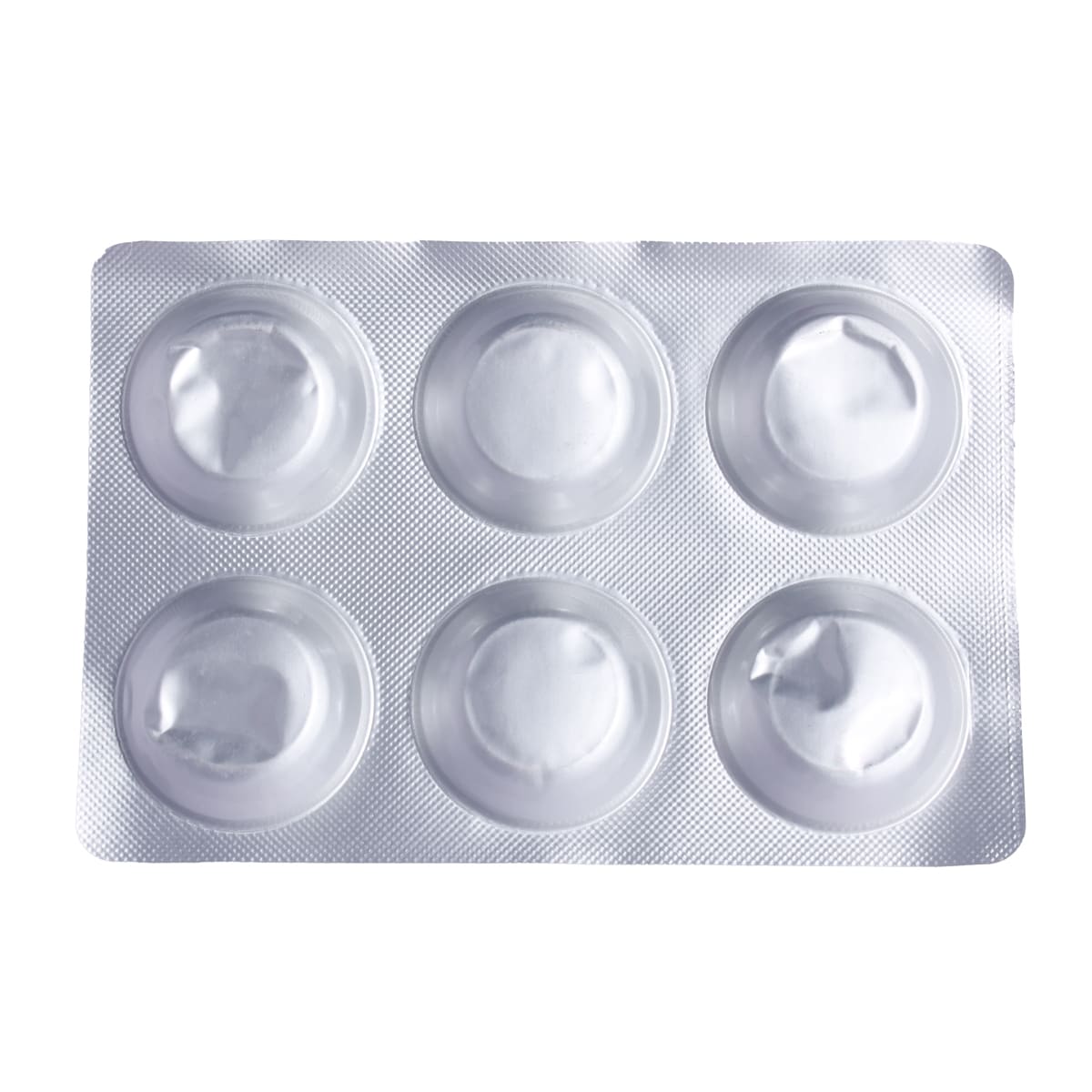Dynulta Tablet 6's
MRP ₹316.5
(Inclusive of all Taxes)
₹38.0 Cashback (12%)
Provide Delivery Location
Online payment accepted
 Prescription drug
Prescription drugWhats That
Composition :
Manufacturer/Marketer :
Consume Type :
Expires on or after :
Return Policy :
About Dynulta Tablet
Dynulta Tablet belongs to the class of medications called mineral supplements indicated for controlling serum phosphorus levels in adult chronic kidney disease patients on haemodialysis or peritoneal dialysis.
Dynulta Tablet contains 'sucroferric oxyhydroxide'. It helps to lower phosphate levels in the blood and prevents complications caused by high phosphate levels in the blood, especially in dialysis patients who are unable to eliminate excess phosphate levels.
Dynulta Tablet should be taken as prescribed by your doctor. Dynulta Tablet can cause side effects such as diarrhoea, nausea, vomiting, constipation, and indigestion in some cases. These side effects are not universal and vary from person to person. Please consult your doctor if you experience any of the side effects persistently.
Do not take Dynulta Tablet if you are allergic to any of the contents, if you have/had haemochromatosis, or iron overload disorder. Before using this medication, inform your doctor of any medical issues you may have. Consult your doctor if you are pregnant or breastfeeding. The safety and efficacy of Dynulta Tablet in children blow 2years have not been established.
Uses of Dynulta Tablet
Directions for Use
Key Benefits
Dynulta Tablet contains sucroferric oxyhydroxide indicated for controlling serum phosphorus levels in adult chronic kidney disease patients on haemodialysis or peritoneal dialysis. Dynulta Tablet helps to lower phosphate levels in the blood and prevents issues caused by high phosphate levels in the blood, especially in dialysis patients who are unable to get rid of excess phosphate levels.
Storage
- If you are experiencing fecal discoloration as a side effect of medication, it is important to talk to your doctor. They can help you determine the cause of the discoloration and recommend the best course of treatment.
- Stay hydrated by drinking plenty of fluids to prevent constipation.
- Adopt a balanced diet rich in fibre to regulate bowel movements and prevent constipation.
- Eat less or stay away from foods like beets, carrots, and leafy greens that can temporarily change the colour of your stool.
- Eat less dark-coloured foods, such as black liquorice or blueberries.
- Inform Your Doctor: Notify your doctor immediately about your diarrhoea symptoms. This allows them to adjust your medication or provide guidance on managing side effects.
- Stay Hydrated: Drink plenty of fluids to replace lost water and electrolytes. Choose water, clear broth, and electrolyte-rich drinks. Avoid carbonated or caffeinated beverages to effectively rehydrate your body.
- Follow a Bland Diet: Eat easy-to-digest foods to help firm up your stool and settle your stomach. Try incorporating bananas, rice, applesauce, toast, plain crackers, and boiled vegetables into your diet.
- Avoid Trigger Foods: Steer clear of foods that can worsen diarrhoea, such as spicy, fatty, or greasy foods, high-fibre foods, and dairy products (especially if you're lactose intolerant).
- Practice Good Hygiene: Maintain good hygiene to prevent the spread of infection. To stay healthy, wash your hands frequently, clean and disinfect surfaces regularly, and avoid exchanging personal belongings with others.
- Take Anti-Diarrheal Medications: If your doctor advises, anti-diarrheal medications such as loperamide might help manage diarrhoea symptoms. Always follow your doctor's directions.
- Keep track of your diarrhoea symptoms. If they don't get better or worse or are accompanied by severe stomach pain, blood, or dehydration signs (like extreme thirst or dark urine), seek medical help.
- Inform your doctor about the nausea and discuss possible alternatives to the medication or adjustments to the dosage.
- Divide your daily food intake into smaller, more frequent meals to reduce nausea.
- Opt for bland, easily digestible foods like crackers, toast, plain rice, bananas, and applesauce.
- Avoid certain foods that can trigger nausea, such as fatty, greasy, spicy, and smelly foods.
- Drink plenty of fluids, such as water, clear broth, or electrolyte-rich beverages like coconut water or sports drinks.
- Use ginger (tea, ale, or candies) to help relieve nausea.
- Get adequate rest and also avoid strenuous activities that can worsen nausea.
- Talk to your doctor about taking anti-nausea medication if your nausea is severe.
- Record when your nausea occurs, what triggers it, and what provides relief to help you identify patterns and manage your symptoms more effectively.
Drug Warnings
Do not take Dynulta Tablet if you are allergic to any of the contents, if you have/had haemochromatosis, or iron overload disorder. Notify your doctor if you have/had inflammation of the peritoneum, stomach/intestinal surgery, stomach and/or liver problems. Before using this medication, tell your doctor about any health complications you have. Inform your doctor if you are taking any other medications. Consult your doctor if you are pregnant or nursing.
Drug-Drug Interactions
Drug-Drug Interactions
Login/Sign Up
Drug-Food Interactions
Drug-Food Interactions
Login/Sign Up
Diet & Lifestyle Advise
- Reduce the amount of phosphorus in your foods and beverages.
- Eat low phosphorus foods such as sourdough bread, corn or rice cereals, cream of wheat, unsalted popcorn and some light-coloured sodas & lemonade.
- Avoid high phosphorus foods, including bran cereals, oatmeal, nuts, sunflower seeds, whole-grain bread and dark-coloured colas.
Side Effects of Dynulta Tablet
- Diarrhoea
- Nausea
- Vomiting
- Constipation
- Indigestion
Habit Forming
Therapeutic Class
All Substitutes & Brand Comparisons
Author Details
We provide you with authentic, trustworthy and relevant information
Drug-Diseases Interactions
Drug-Diseases Interactions
Login/Sign Up
FAQs
Dynulta Tablet helps to lower phosphate levels in the blood and prevents complications caused by high phosphate levels in the blood, especially in dialysis patients who are unable to eliminate excess phosphate levels.
No, it is a prescribed medication primarily used to keep serum phosphorus levels under control in adult chronic kidney disease (CKD) patients on haemodialysis (HD) or peritoneal dialysis (PD). Taking it on your own can result in undesirable side effects.
Dynulta Tablet may cause your stools to turn black. This could be an indication of bleeding in the digestive tract. Inform your doctor if you notice black stools, tiredness and breathlessness.
Diarrhoea could be an unintended consequence of Dynulta Tablet. If you have diarrhoea, drink plenty of fluids to avoid dehydration. If you have severe diarrhoea or find blood in your stools, consult your physician.
Drug-Drug Interactions Checker List
- ERDAFITINIB
- DOXYCYCLINE
- LEVOTHYROXINE
Special Advise
- To rule out the possibility of electrolyte imbalance, electrolyte levels should be monitored on a regular basis.
Disease/Condition Glossary
Hyperphosphatemia: Hyperphosphatemia is an electrolyte disorder characterised by an elevated phosphate level in the blood. Healthy kidneys balance phosphorus levels in the body by removing excess phosphorus from the blood. If you have kidney disease, your kidneys may not be able to eliminate excess phosphorus. It has the potential to be extremely harmful to one's health. High phosphorus levels do not always cause symptoms. Extra phosphorus in the blood can eliminate calcium from the bones and other parts of the body, resulting in low calcium (hypocalcemia).

Have a query?
Alcohol
Safe if prescribed
It is not recommended to drink alcohol while taking Dynulta Tablet because it may cause unpleasant side effects.
Pregnancy
Consult your doctor
Please seek advice from a healthcare professional. There are no adequate and well-controlled studies on pregnant women. Your doctor will prescribe only if the benefits outweigh the risks.
Breast Feeding
Consult your doctor
Consult your healthcare professional as there is no substantial research yet on the use of Dynulta Tablet in breastfeeding/nursing mothers.
Driving
Safe if prescribed
It is unknown whether Dynulta Tablet affects driving ability. Do not drive or operate machinery if you have any symptoms that impair your ability to concentrate or react.
Liver
Consult your doctor
Consult your doctor if you have liver problems. Your doctor will prescribe only if the benefits outweigh the risks.
Kidney
Consult your doctor
Consult your doctor if you have kidney problems.
Children
Safe if prescribed
The safety and efficacy of Dynulta Tablet in children below 2years have not been established.
Recommended for a 30-day course: 10 Strips








_0.jpg?tr=q-85)
